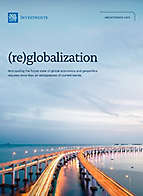The COVID-19 pandemic, Russia's invasion of Ukraine, U.S.-China competition, and the increasing visibility of climate change have further enhanced the narrative that globalization-driven cost reduction and efficiency may no longer match countries' primary national interests: security and access to resources.
But the story doesn't stop there. Our exploration of three of the world's most sensitive supply chains — access to technology, energy, and the global financial system — reveals deglobalization may be a knee-jerk reaction rather than a final result.
Instead, we challenge investors to consider a more investable future around (re)globalization.
Why the world is headed for (re)globalization
Lauren Goodwin
Director of Portfolio Strategy
New York Life Investments
Why the world is headed for (re)globalization
Lauren Goodwin
Director of Portfolio Strategy
New York Life Investments
Savvy Investor Special Report: The (re)globalization Megatrend
The world is changing quickly – but not in the way that many people think. Instead of deglobalization, a new form of globalization is emerging, and with it a host of new challenges alongside new prospects for investors willing to tackle this hugely complicated megatrend.
Explore the three global supply chain shifts set to steer us away from deglobalization and towards (re)globalization.
- ENERGY SUPPLY
- TECHNOLOGY
- GLOBAL FINANCE
- PORTFOLIO IMPLICATIONS
(re)generating energy supply
Energy security, not to mention a green energy transition, will require meaningful change in political process and resource access.
Navigating the Path to Energy Transition
Safeguarding Supply Chains, Unleashing Innovation & Unlocking Financial Potential
David Czupryna
Senior Portfolio Manager
Candriam
(re)negotiating technology relationships
Vulnerabilities in semiconductor supply chains pose a threat to the global economy, requiring international cooperation on tech production.
Balancing risks and rewards in an era of accelerated deglobalization
Self-sufficiency and Impeded AI Advancements
Johan Van der Biest
Deputy Head of Thematic Global Equity
Candriam
(re)imagining global finance
There’s plenty of legitimate pushback to a dollar-dominated global financial system. But de-dollarization will be accelerated by innovation, not geopolitical change alone.
On nearly every available metric, the U.S. dollar dominates global finance and provides benefits on many levels, such as giving countries with volatile currencies a more stable alternative. Additionally, the dollar makes up 59% of the global foreign exchange reserves. But for as long as the dollar has been dominant in the global financial system, it has also been clear that this system does not work for everyone — at least not all the time.
"However, despite occasional moves to diversify away from the dollar, it has been difficult to unseat - and we believe de-dollarization isn't likely to come from geopolitical competition alone."
In fact, changes in dominant currencies have historically come from innovation, perhaps accelerated by conflict, rather than a single event. If the dollar is to be unseated, it will be by an alternative system that provides more benefits than those reaped by dollar dominance, and at a lower cost.
(re)investing for the future
“Change? Change? Aren't things bad enough already?” Lord Salisbury
Delving into the potential of innovation
Sector Trends, Growth Prospects & Analyzing the Complete Value Chain
Ken Van Weyenberg
Senior Portfolio Manager, Thematic Equity
Candriam
Investment implications of (re)globalization: Real estate themes
Simon Martin
Senior Partner, Chief Investment Strategist
Tristan Capital Partners



Uncover investment strategies for the new world
In this new world — powered by re-globalization — investment opportunities abound. Being ahead of the curve in spotting and interpreting these trends can generate meaningful portfolio value.
For our full analysis of how access to technology, energy, and the global financial system will drive re-globalization and shape investment strategies, download the Megatrends report.
57665072


